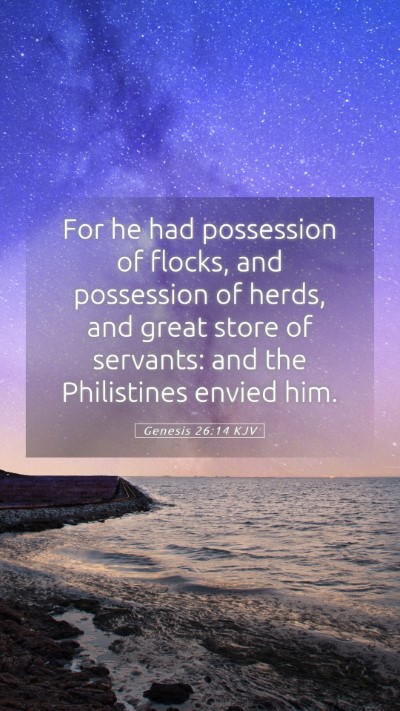Genesis 26:14 - Understanding Scripture
Genesis 26:14 states, "For he had possession of flocks, and possession of herds, and great store of servants: and the Philistines envied him."
This verse is part of the narrative that reflects God's blessings upon Isaac and the resultant envy from the Philistines. To delve deeper into this scripture, we can look at various public domain commentaries for a comprehensive understanding.
Bible Verse Commentary
This verse highlights the abundant wealth and prosperity that Isaac had accumulated. Let us explore its meaning through insights from Matthew Henry, Albert Barnes, and Adam Clarke.
Matthew Henry's Commentary
Matthew Henry notes that Isaac's wealth included flocks and herds, signifying a sign of God’s favor and blessing. He emphasizes the idea that true prosperity comes from God and can be a source of contention among those who do not share that blessing. The envy felt by the Philistines serves to illustrate the principle that the righteous may face opposition not only for their actions but also for the blessings they receive.
Albert Barnes' Commentary
In Albert Barnes' observations, the accumulation of wealth by Isaac is seen as a fulfillment of God's promise to his father Abraham. Barnes highlights that Isaac's success brought envy from the Philistines, which can be interpreted as a common reaction to God’s favor. He elaborates on the idea that wealth can sometimes be a burden and lead to strife, as seen in the context of Isaac's interactions with the Philistines who were threatened by his success.
Adam Clarke's Commentary
Adam Clarke expounds on the social dynamics at play in this verse. He points out that the Philistines’ envy of Isaac reflects broader themes of rivalry and competition, particularly in agrarian societies where wealth and productivity are visible markers of success. Clarke stresses the importance of recognizing that God’s blessings can provoke reactions that lead to conflict, thus highlighting the complexities of human relationships influenced by divine favor.
Spiritual Applications
The implications of Genesis 26:14 extend beyond mere historical recording. It offers vital Bible study insights that are applicable today:
- Understanding of Blessings: Recognizing that blessings from God can lead to envy and conflict among peers.
- Response to Envy: How one responds to the envy of others can reflect one’s character and faith.
- Divine Favor: Understanding that wealth or success is often a direct result of faithfulness and obedience to God.
Bible Study Tools and Insights
For those engaged in Bible study groups or online Bible study, Genesis 26:14 can serve as a discussion point for various themes:
- Wealth and Obedience: How wealth should be perceived in light of one’s relationship with God.
- Conflict from Blessing: Exploring how divine blessings can lead to interpersonal issues.
- Divine Promises: Discussion on the continuity of God’s promises from Abraham to Isaac and their relevance today.
Related Bible Verses for Cross-Reference
Genesis 26:14 is notably related to the following scriptures, which further illuminate its themes:
- Genesis 17:6 - God's promise of making Abraham exceedingly fruitful.
- Genesis 12:2 - The promise that Abraham would be made into a great nation and blessed.
- Proverbs 14:30 - The notion that envy is rottenness to the bones, paralleling the effects of envy depicted in this verse.
Conclusion
Genesis 26:14 provides rich material for biblical exegesis and study, showcasing the complexities of blessings, envy, and human relationships. By thoroughly analyzing the meanings derived from this scripture with an understanding of its historical context, one can gain greater insight into the nature of God's favor and its impact on life.
Engaging with this verse can enhance one's Bible verse understanding and equip individuals with the tools needed to navigate both spiritual and relational aspects of life. The significance of this Bible verse continues to resonate, inviting believers to reflect on their own lives and the way they perceive and respond to the blessings bestowed upon them.


